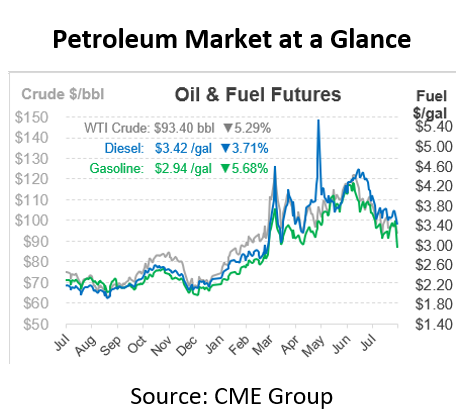
Oil Sinks on Weak Economy, OPEC Deal This Week
Oil markets are seeing large losses this morning as economic concerns continue to weigh. While US economists are still debating on whether the US is in a recession, data from other countries show more concrete evidence of a weakening landscape. A new report from S&P Platts shows that European manufacturing contracted in July for the first time since 2020, while China’s manufacturing sector is teetering on the brink of contraction. China’s COVID lockdowns were a big contributor to weakened manufacturing output. This survey reinforces the bleak economic picture weighing on oil markets, putting demand in jeopardy.
OPEC is also in the spotlight, with a meeting on Wednesday to determine September’s production policy. Saudi Arabia hit a two-year high for exports in July, suggesting the kingdom is heeding President Biden’s request to ramp up output. However, the group is also trying to placate the largest non-OPEC member of the OPEC+ group – Russia. The OPEC+ deal signed expires at the end of September, so OPEC is expected to stay the course until the deal officially ends. At that point, countries will be free to produce as much oil as they’d like – assuming they have the infrastructure to materialize those increases. OPEC may surprise the market by increasing production sooner, but Russia is likely to oppose any change to the deal before its expiration.
Last week Congress announced progress on the Inflation Reduction Act, a modified version of President Biden’s Build Back Better law. The bill has received mixed reviews, with the American Petroleum Institute saying the bill is an improvement but still opposing measures that would increase taxes on oil & gas companies. On the other hand, environmental lobbyists say the bill doesn’t go far enough to fight climate change. The legislation will expand access to drilling on public lands and extend some tax credits beneficial to the industry, while also increasing methane taxes and fuel import fees. Politicians claim the new policies will reduce emissions by up to 40% over the life of the bill. Outside of energy policies, the law sets a 15% minimum on corporate taxes and closes tax code loopholes, netting more income than the climate component would cost. For a full review of the bill and its economic impact, check out the budget estimate from Penn Wharton here.
This article is part of Daily Market News & Insights
MARKET CONDITION REPORT - DISCLAIMER
The information contained herein is derived from sources believed to be reliable; however, this information is not guaranteed as to its accuracy or completeness. Furthermore, no responsibility is assumed for use of this material and no express or implied warranties or guarantees are made. This material and any view or comment expressed herein are provided for informational purposes only and should not be construed in any way as an inducement or recommendation to buy or sell products, commodity futures or options contracts.






